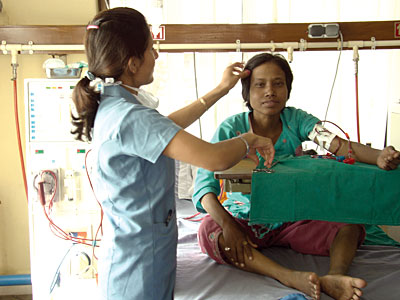 ELIPHA PRADHANANGA |
Rabis Nyachhyon, 45, owns a small costume jewelry shop at Lagankhel. He is a thin man and speaks with a soft voice.
At first glance, it is hard to tell that he is critically ill from kidney failure. The only visible symptom is his dark skin from the buildup of toxins. Nyachhyon requires a four-hour dialysis at the hospital twice a week costing him Rs 20,000 a month.
The only option left for him and thousands of others is a transplant, but by law only relatives can donate kidneys. None of his relatives have a match. "I would rather have done the transplant in Nepal where it only costs around Rs 400,000 but going to India would mean I have to get a kidney from the black market and I can't really afford that."
Dialysis is the only option for now. At the government Bir Hospital, it costs up to Rs 10,000 a month, but the machines are in heavy demand. At the National Kidney Centre it is double that and private hospttials charge more.
Arjun Raj Satyal, 59, has been under dialysis for 10 months. He used to go to Nepal Medical College, but shifted to Bir because he couldn't afford it any longer.
Kon Bahadur Thapa, 55, comes to Bir Hospital for a checkup every three months. His wife donated a kidney 12 years ago and he had the transplant done in Lucknow. "Transplant is a better option," remarks Thapa, "it is more expensive but after a transplant you can lead a more normal life."
But transplants are not for everyone. factors to consider include age, donor compatibility and cost. For the poor dialysis, as expensive as it may be, is their only hope. Even a transplant is not the end of a patient's problems. After the transplant is complete, the patients need to take medicines through out their lives to maintain a healthy kidney. The medication can cost from Rs 20 to 25 thousand per month.
Patients must continue their regular dialysis once they opt for the procedure. "I tried to skip dialysis once," recalls Satyal, "but immediately I had difficulty breathing. One dialysis can keep me comfortable for three days, fourth day and I'm already having trouble."
Ideally patients should have dialysis every day, but most Nepalis can't afford it, says nephrologist Kalpana Shrestha at the National Kidney Centre. She says people in Nepal underestimate the need to take preventive measures to stop kidney degeneration (see box).
"You don't realise how valuable each part of the body is unless something like this happens," says Satyal's wife Sabita Satyal. "People at the hospital treat patients like us with extra kindness maybe it is because they know
that we are financially burdened."
Dialysis that started at few centres in Kathmandu is now available at several hospitals and clinics like Manipal, Charak and Gandaki hospitals in Pokhara. Dialysis centres are also available in Bharatpur, Biratnagar, Birganj, Dharan and Nepalgunj.
KIDNEY CARE
Preventing the causes of kidney malfunction is cheaper than treating damaged kidneys.
1. Monitor blood pressure
2. Monitor blood sugar, diabetes
3. Reduce weight
4. Stop smoking
5. Special care if there is family history
Read also:
The village of the kidneys, SUNIL NEUPANE
See also:
STAYING ALIVE, NARESH NEWAR


